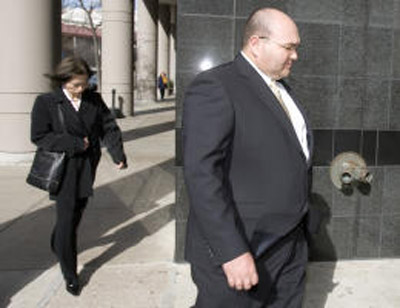Kenneth Hebert and his common-law wife Leticia Zamora, owners of TexStar Labs and Phalco Labs, faced United States District Judge David Hittner for sentencing on January 28, 2009. Hebert was senteced to four years imprisonment (or double the term of imprisonment advocated by prosecutors) whereas Zamora withdrew her guilty plea after Judge Hittner denied her probation deal with the government (“Pearland man gets prison for at-home steroid factory,” January 28).
A Pearland man who ran a major anabolic steroid factory in his house was sentenced to four years in federal prison on Wednesday, but his wife withdrew her guilty plea and opted to go to trial.
U.S. District Judge David Hittner sentenced Kenneth Hebert to about twice what prosecutor Peter Mason had suggested for distributing the performance-enhancing drug, made of ingredients from China.
Hebert and Zamora both pleaded guilty to their respective roles in the illegal operation of a large-scale underground anabolic steroid laboratory out of their Houston-area home. The couple manufactured raw steroid powder into oral and injectable steroid products that were distributed under the TexStar Labs and Phalco Labs label. The steroid case represented one of the largest UGL steroid busts resulting from Operation Raw Deal.
The couple decided to spend their available funds to hire an attorney from the Montalvo Law Firm to represent Leticia Zamora and provide her with the best opportunity to avoid prison time so that she could raise the couple’s two young children, ages five and seven; Kenneth Hebert was represented by a federal public defender.
Federal prosecutor Peter Mason advocated two years imprisonment for Kenneth Hebert, who was the mastermind behind the underground lab, to U.S. District Judge David Hittner. Since Leticia Zamora’s role in the UGL was minimal, according to her lawyer Gerardo Montalvo, the government only advocated probation for the mother of two.
Instead, Judge Hittner doubled the government’s recommended prison term for Hebert and refused to accept a probation deal for Zamora. Judge Hittner did not explain his rationale for sentencing decision other than to chastise Hebert in open court for selling steroids to children.
Instead, you sold them to other people’s children? Hittner asked Hebert, who is in his late 30s.
Steroid law expert Rick Collins, partner at the law firm of Collins, McDonald & Gann, commented on the sentencing after reading the Houston Chronicle story by Mary Flood.
“It is quite rare that a judge doubles the imprisonment term being advocated by the prosecutor. The article doesn’t fully explain the judge’s reasoning (beyond the comment about kids) and there may be unknown but significant factors, but it sounds like the government recommended a sentence below the applicable Guidelines sentence because Hebert cooperated… Sounds like the benefits of Hebert helping the feds investigate or arrest others “ i.e., the leniency recommendations regarding both Hebert and his wife “ fell on deaf judicial ears. “
Attorney Rick Collins suspects that Judge Hittner’s decision may have been influenced by facts beyond the charges to which Hebert and Zamora pleaded guilty.
Don’t forget that federal sentencing takes into account all relevant conduct, not just the strict limits of what is specifically admitted in the guilty plea. In other words, facts contained in counts 2 “ 29 could have been used as a basis for sentence.
While Hebert only pleaded guilty to one count of “conspiracy to possess with intent to distribute (anabolic steroids)” and Zamora only pleaded guilty to one count of “conspiracy to commit money laundering,” they were indicted by a grand jury on an additional 28 counts related to steroid distribution and money laundering.
Additionally, U.S. District Judge Hittner has a history of denying the so-called C-pleas according to a source familiar with his cases. Leticia Zamora made a plea agreement under Rule 11(c)(1)(A)&(C) which gives the defendant the option to withdraw a guilty plea if the judge denies the sentencing deal. On the other hand, Kenneth Hebert made a plea agreement under Rule 11(c)(1)(A)&(B) which does not allow him to withdraw the guilty plea.
Steroid attorney Rick Collins urges the following take-home lessons about plea bargain agreements from this case, particularly for anyone who finds themselves in a similar predicament:
- [R]eminder that until the day of sentence there is no certainty of sentence in a federal court house.
- [F]ederal sentencing takes into account all relevant conduct, not just the strict limits of what is specifically admitted in the guilty plea.
About the author
Millard writes about anabolic steroids and performance enhancing drugs and their use and impact in sport and society. He discusses the medical and non-medical uses of anabolic-androgenic steroids while advocating a harm reduction approach to steroid education.


Leave a Reply
You must be logged in to post a comment.